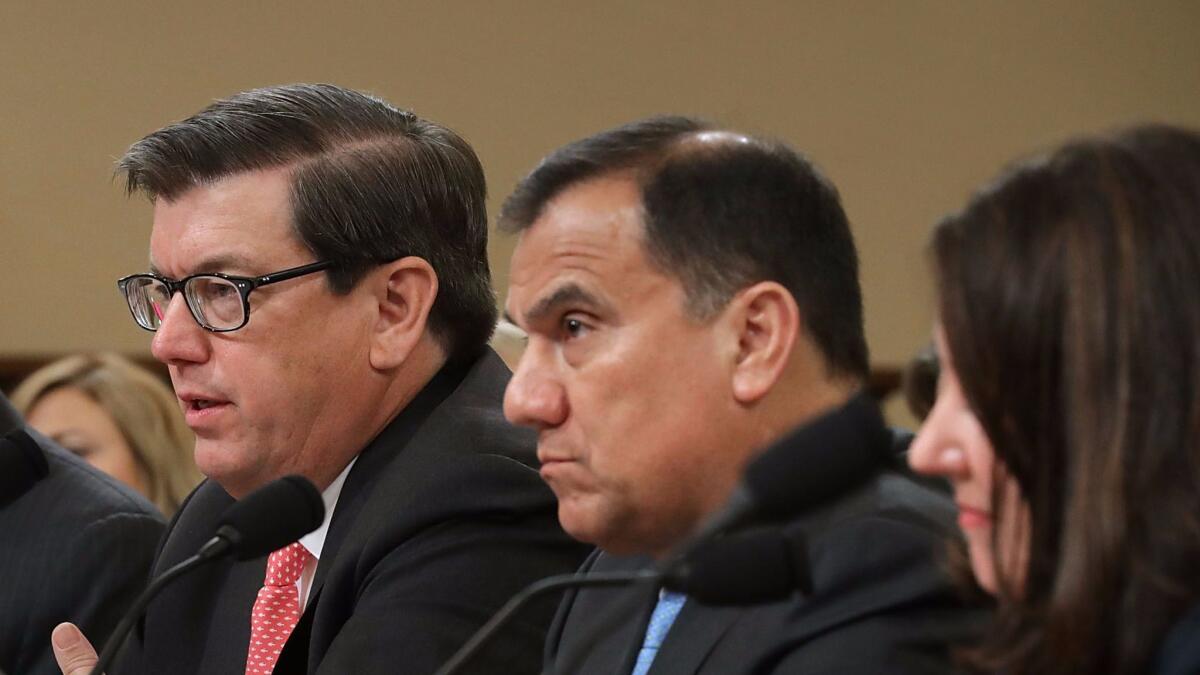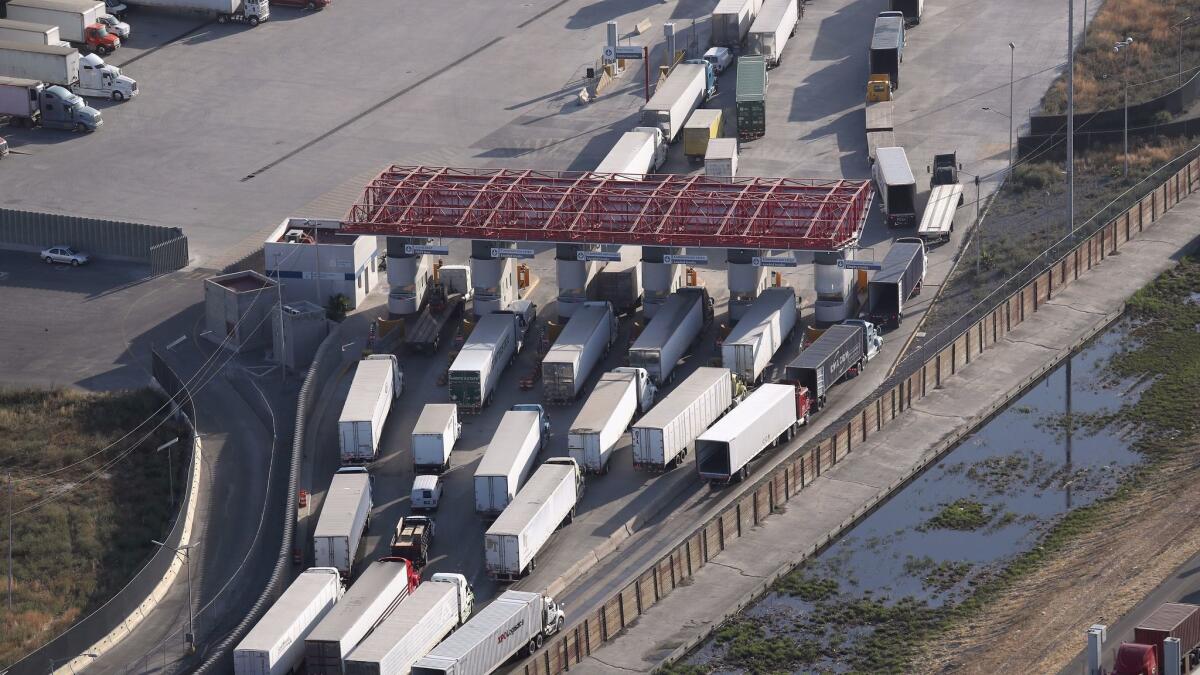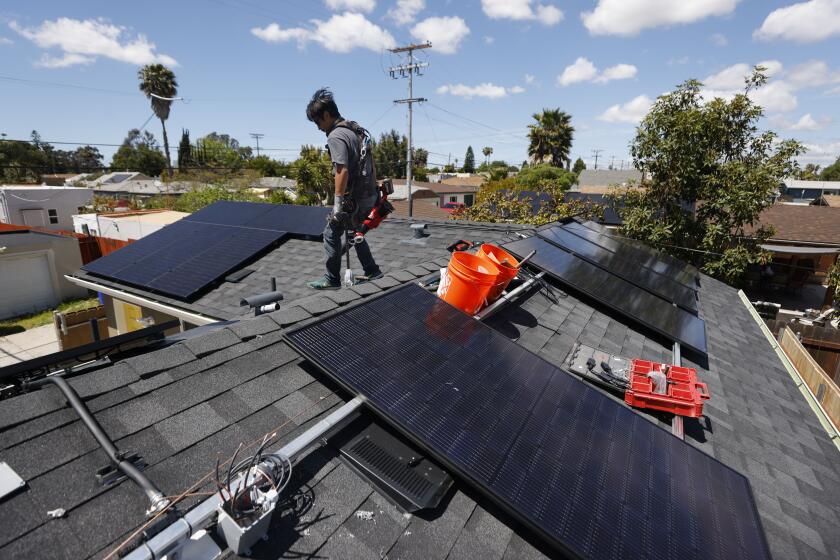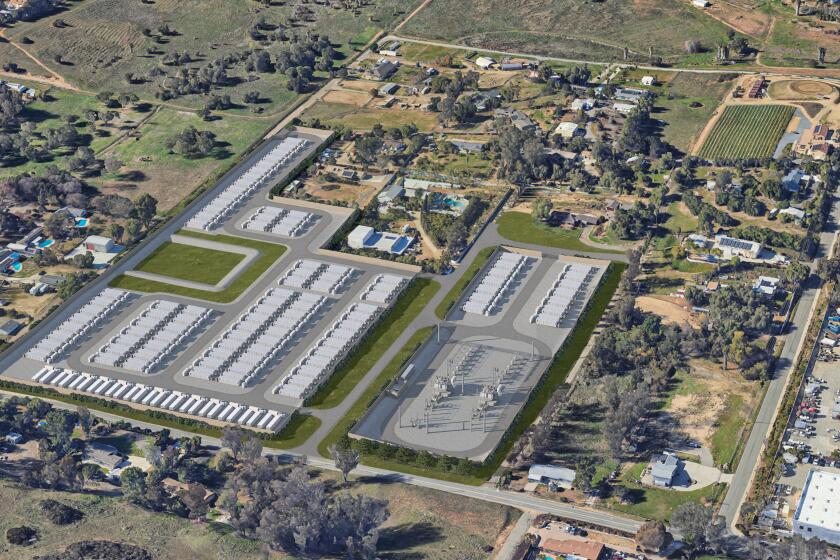Locals watch closely as NAFTA negotiations begin

The talks in Washington run through the week but that is only the start of the process.
Blessed by some, blistered by others, the 23-year-old North American Free Trade Agreement — known as NAFTA — faces a renegotiation process that begins Wednesday in Washington D.C.
But with commercial exchange between San Diego and Tijuana estimated at $2.1 million per day, every thrust and parry in the talks among trade representatives from the U.S., Mexico and Canada will be watched intently by many local businesses, unions and economists.
“It’s a very big deal based on the relationship that has been established over many years between Baja and San Diego,” said Gustavo de la Fuente, executive director of the Smart Border Coalition, a San Diego-based nonprofit that works on reducing lengthy border wait times that impede economic growth.
“In this region, a lot of business ties … are also family ties,” de la Fuente said. ”For our region, this is a very significant event.”
Since NAFTA went into effect in January 1994, trade among the U.S., Mexico and Canada has quadrupled to more than $1 trillion.
But the deal has been criticized by labor unions who say it has cost the U.S. manufacturing jobs and environmental groups who say the agreement doesn’t go far enough to advance climate and human rights goals.
The NAFTA talks come after President Donald Trump, who on the campaign trail often called the agreement “a disaster,” had U.S. Trade Representative Robert Lighthizer formally open discussions earlier this year.
While Trump has threatened to pull out of NAFTA — last month the president told the Wall Street Journal, “Maybe we’ll have to terminate it” — Lighthizer indicated in a letter to Congress this summer that the administration is looking to revise NAFTA, rather than blow it up.
For example, there was no mention in the letter of a 20 percent tax on imports from Mexico and other countries with which the U.S. has a trade deficit.
The U.S. has a $62.7 billion trade deficit with Mexico and an $8 billion surplus with Canada. The talks in Washington mark the first renegotiation of the agreement.
James D. Hamilton, economics professor at UC San Diego, said he hopes there is “nothing too radical” in any potential changes to the agreement.
“I think NAFTA has benefited the U.S., Canada and Mexico,” Hamilton said. “My hope would be that we don’t see something that is significantly destabilizing for the economies” of the three nations.
The talks in Washington run through the week but that is only the start of the process. Negotiations will also be held in Mexico and Canada and any final agreement will have to be approved by the legislative or parliamentary branches of each country.
Sempra Energy, the Fortune 500 company based in San Diego, is also watching the NAFTA talks closely.
In the past four years Mexico has undertaken a massive effort to reform its energy sector, stripping its state-run oil and natural gas giants of their monopoly status. That has opened the door for investment from international companies, many from the United States.
Sempra has a subsidiary in Mexico, IEnova, that has reached agreements on projects ranging from natural gas pipelines to renewable energy to liquid fuels.
In 2016, IEnova completed more than $5 billion in transactions, including an energy infrastructure project worth about $1.1 billion.

Last month, Dennis Arriola, executive vice president for corporate strategy and external affairs at Sempra, appeared before a subcommittee on Capitol Hill regarding a NAFTA makeover.
“Our investments in Mexico have made excellent business sense,” Arriola said. “Investing in Mexico has also been a natural geographic extension of our business. Our San Diego operations share a border with Mexico. We are tied together economically, environmentally and culturally.”
Since Mexico’s oil and gas operations were still nationalized when NAFTA went into effect in 1994, energy in Mexico is not a part of the original agreement.
That is expected to change and energy companies are anxious to make sure any renegotiation includes provisions that do not disrupt their investments.
“A growing energy trade partnership is a win-win outcome for both the U.S. and Mexico,” Arriola said. “If negotiators can preserve these benefits while finding consensus to modernize and improve the agreement, North America will become an even more integrated and powerful energy market in the years to come.”
Natural gas exports from the U.S. to Mexico have dramatically increased in recent years, having reached near-record levels in the first five months of this year.
David Crisostomo, an associate director based in Mexico City for the energy analysis firm IHS Markit, said a NAFTA renegotiation is unlikely to disturb energy markets.
“Gas exports for the U.S. to Mexico are a key market outlet,” Crisotomo said while taking part in a conference at UC San Diego in May. “So I don’t think you want to touch that.”
Business is brisk north of the border too.
Canada is the largest energy trading partner of the U.S., with transactions in 2013 estimated at $140 billion. More than 80 pipelines and 30 electricity transmission lines connect the two countries.
But there are hurdles.
It took three years of talks to wrap up the original agreement but the partners have expressed hope of completing negotiations by early next year, ahead of mid-term elections in the U.S. and a presidential election in Mexico.
The early front-runner in the Mexican presidential race is Andrés Manuel López Obrador, a left-wing populist who has called for putting Mexico’s energy reform policies to a referendum.
Labor unions have long opposed NAFTA.
“Since its implementation, hundreds of thousands of workers in the U.S. and Canada have lost their jobs as company after company have moved production to Mexico, a country where fundamental human rights do not exist,” said Robert Martinez Jr., president of the International Association of Machinists and Aerospace Workers.
Teamsters president James P. Hoffa said NAFTA “has been ineffective in enforcing basic labor rights, especially in Mexico.”
Cross-border trucking has been a major concern of local Teamsters, who say trucks coming from Mexico are substandard and the drivers are not required to abide by the rules, licenses and training that U.S. drivers have to follow.

Victor Torres, secretary-treasurer of Teamsters Local 481, said labor protections and the right for workers in Mexico to organize need to be tackled.
“In the original NAFTA agreement, these were not even addressed at all and if they were addressed they were in the weakest language possible,” Torres said. “So these things need to be tightened up in the renegotiation. It’s almost like we should rewrite the whole thing.”
Many environmental groups don’t like NAFTA either, arguing the deal’s incorporation of environmental side-agreements is toothless and that NAFTA’s Chapter 11 provision gives corporations too much power.
“If Trump’s cabinet full of corporate polluters and Wall Street billionaires is any indication of what he has planned, his NAFTA redux will likely include even more handouts to the corporations that have used NAFTA to profit off of Americans’ misfortune for more than 20 years,” said Sierra Club executive director Micheal Brune.
The Smart Borders Coalition wants what it calls a “modernized” NAFTA to help accelerate the flow of cargo, pedestrians and vehicles between the U.S. and Mexico at places like the San Ysidro and Otay Mesa ports of entry.
The coalition filed its recommendations as part of the federal government’s comment period.
“What compels us is the very long wait times that we have seen on the border, over many years,” de la Fuente said. “It is important for us that people can get across the border northbound and southbound faster.”
A report from the San Diego Association of Governments estimated that traffic congestion and delays on the border cost the economies of San Diego County and Baja California an estimated $6 billion a year in gross output.
“There’s been a lot of political posturing, we understand that,” de la Fuente said. “But that doesn’t mean that the agreement can’t be updated in a way that benefits both countries.”
Business
rob.nikolewski@sduniontribune.com
(619) 293-1251 Twitter: @robnikolewski
ALSO
Energy looks to be spared in any NAFTA reset
Despite question marks in Mexico, Sempra subsidiary moves full-speed ahead
Boiling over on the border: The reasons for the gasoline protests in Mexico
Get U-T Business in your inbox on Mondays
Get ready for your week with the week’s top business stories from San Diego and California, in your inbox Monday mornings.
You may occasionally receive promotional content from the San Diego Union-Tribune.











